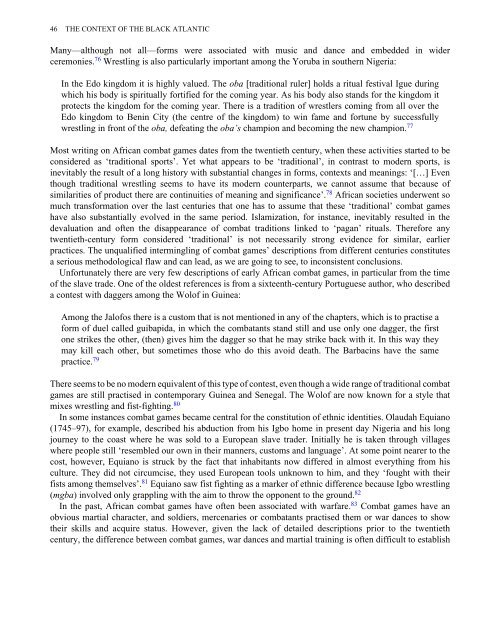Capoeira: The History of an Afro-Brazilian Martial Art
Capoeira: The History of an Afro-Brazilian Martial Art
Capoeira: The History of an Afro-Brazilian Martial Art
Create successful ePaper yourself
Turn your PDF publications into a flip-book with our unique Google optimized e-Paper software.
46 THE CONTEXT OF THE BLACK ATLANTIC<br />
M<strong>an</strong>y—although not all—forms were associated with music <strong>an</strong>d d<strong>an</strong>ce <strong>an</strong>d embedded in wider<br />
ceremonies. 76 Wrestling is also particularly import<strong>an</strong>t among the Yoruba in southern Nigeria:<br />
In the Edo kingdom it is highly valued. <strong>The</strong> oba [traditional ruler] holds a ritual festival Igue during<br />
which his body is spiritually fortified for the coming year. As his body also st<strong>an</strong>ds for the kingdom it<br />
protects the kingdom for the coming year. <strong>The</strong>re is a tradition <strong>of</strong> wrestlers coming from all over the<br />
Edo kingdom to Benin City (the centre <strong>of</strong> the kingdom) to win fame <strong>an</strong>d fortune by successfully<br />
wrestling in front <strong>of</strong> the oba, defeating the oba’s champion <strong>an</strong>d becoming the new champion. 77<br />
Most writing on Afric<strong>an</strong> combat games dates from the twentieth century, when these activities started to be<br />
considered as ‘traditional sports’. Yet what appears to be ‘traditional’, in contrast to modern sports, is<br />
inevitably the result <strong>of</strong> a long history with subst<strong>an</strong>tial ch<strong>an</strong>ges in forms, contexts <strong>an</strong>d me<strong>an</strong>ings: ‘[…] Even<br />
though traditional wrestling seems to have its modern counterparts, we c<strong>an</strong>not assume that because <strong>of</strong><br />
similarities <strong>of</strong> product there are continuities <strong>of</strong> me<strong>an</strong>ing <strong>an</strong>d signific<strong>an</strong>ce’. 78 Afric<strong>an</strong> societies underwent so<br />
much tr<strong>an</strong>sformation over the last centuries that one has to assume that these ‘traditional’ combat games<br />
have also subst<strong>an</strong>tially evolved in the same period. Islamization, for inst<strong>an</strong>ce, inevitably resulted in the<br />
devaluation <strong>an</strong>d <strong>of</strong>ten the disappear<strong>an</strong>ce <strong>of</strong> combat traditions linked to ‘pag<strong>an</strong>’ rituals. <strong>The</strong>refore <strong>an</strong>y<br />
twentieth-century form considered ‘traditional’ is not necessarily strong evidence for similar, earlier<br />
practices. <strong>The</strong> unqualified intermingling <strong>of</strong> combat games’ descriptions from different centuries constitutes<br />
a serious methodological flaw <strong>an</strong>d c<strong>an</strong> lead, as we are going to see, to inconsistent conclusions.<br />
Unfortunately there are very few descriptions <strong>of</strong> early Afric<strong>an</strong> combat games, in particular from the time<br />
<strong>of</strong> the slave trade. One <strong>of</strong> the oldest references is from a sixteenth-century Portuguese author, who described<br />
a contest with daggers among the Wol<strong>of</strong> in Guinea:<br />
Among the Jal<strong>of</strong>os there is a custom that is not mentioned in <strong>an</strong>y <strong>of</strong> the chapters, which is to practise a<br />
form <strong>of</strong> duel called guibapida, in which the combat<strong>an</strong>ts st<strong>an</strong>d still <strong>an</strong>d use only one dagger, the first<br />
one strikes the other, (then) gives him the dagger so that he may strike back with it. In this way they<br />
may kill each other, but sometimes those who do this avoid death. <strong>The</strong> Barbacins have the same<br />
practice. 79<br />
<strong>The</strong>re seems to be no modern equivalent <strong>of</strong> this type <strong>of</strong> contest, even though a wide r<strong>an</strong>ge <strong>of</strong> traditional combat<br />
games are still practised in contemporary Guinea <strong>an</strong>d Senegal. <strong>The</strong> Wol<strong>of</strong> are now known for a style that<br />
mixes wrestling <strong>an</strong>d fist-fighting. 80<br />
In some inst<strong>an</strong>ces combat games became central for the constitution <strong>of</strong> ethnic identities. Olaudah Equi<strong>an</strong>o<br />
(1745–97), for example, described his abduction from his Igbo home in present day Nigeria <strong>an</strong>d his long<br />
journey to the coast where he was sold to a Europe<strong>an</strong> slave trader. Initially he is taken through villages<br />
where people still ‘resembled our own in their m<strong>an</strong>ners, customs <strong>an</strong>d l<strong>an</strong>guage’. At some point nearer to the<br />
cost, however, Equi<strong>an</strong>o is struck by the fact that inhabit<strong>an</strong>ts now differed in almost everything from his<br />
culture. <strong>The</strong>y did not circumcise, they used Europe<strong>an</strong> tools unknown to him, <strong>an</strong>d they ‘fought with their<br />
fists among themselves’. 81 Equi<strong>an</strong>o saw fist fighting as a marker <strong>of</strong> ethnic difference because Igbo wrestling<br />
(mgba) involved only grappling with the aim to throw the opponent to the ground. 82<br />
In the past, Afric<strong>an</strong> combat games have <strong>of</strong>ten been associated with warfare. 83 Combat games have <strong>an</strong><br />
obvious martial character, <strong>an</strong>d soldiers, mercenaries or combat<strong>an</strong>ts practised them or war d<strong>an</strong>ces to show<br />
their skills <strong>an</strong>d acquire status. However, given the lack <strong>of</strong> detailed descriptions prior to the twentieth<br />
century, the difference between combat games, war d<strong>an</strong>ces <strong>an</strong>d martial training is <strong>of</strong>ten difficult to establish




